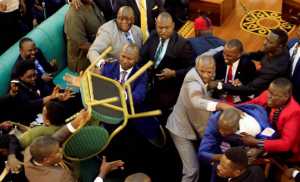
Museveni, 73, has ruled the east African country for 31 years. Under the current age cap, the constitution would bar him from standing again as president in 2021.
Parliament on Monday began debating a bill, presented by a Museveni loyalist, that proposes removing the stipulation a presidential candidate cannot be more than 75 years old, something which opposition activists and rights groups say opens the door for him to be president for life.
Religious leaders and even some MPs from Museveni’s National Resistance Movement (NRM) party have criticised the proposed bill, which needs two thirds of all voting house members to pass. But the NRM is expected to easily muster enough votes.
Protests against the move have been put down with detentions, teargas and live bullets, leaving at least two dead in October.
On Monday, debate proceeded amid heavy deployments of police and military personnel at parliament. After jeering and heckling erupted in the chamber, the six lawmakers were suspended for a single session and ordered out for “undermining the authority of the speaker undermining decorum in the house,” parliament spokesman Chris Obore told Reuters.
The MPs had heckled speaker Rebecca Kadaga and ignored her orders to be seated, Obore said.
House proceedings were adjourned for several hours after the MPs were sent out and resumed later in the afternoon to hear a report from a parliamentary committee that conducted public hearings on the bill.
A report by the majority of the MPs on the committee endorsed the proposal to scrap the age cap and also recommended that the length of a presidential term be extended to seven from the current five years.
Some legislators on the committee disagreed and wrote a minority report.
“It’s our view that the proposal…only seeks to promote life presidency as well as negate modern practices of constitutionalism,” MP Monicah Amoding, who read the minority report, said.
In the mostly acrimonious debate, legislators often shouted each other down and jeered. Opposition MPs, who dominated the debate, tried unsuccessfully to stall the process.
The speaker adjourned the session to Tuesday after she said the chamber’s microphones were experiencing a glitch.
In late September, lawmakers brawled in parliament for two consecutive days as MPs opposed to the bill attempted to filibuster it but were defeated.
At least 25 MPs opposed to the proposed constitutional amendment to prolong Museveni’s tenure were forcibly ejected on orders of the speaker for involvement in fighting.
Museveni initially won broad international support for his embrace of market economics and restoring political order after years of turmoil in the east African country.
But in recent years he has come under a growing spotlight for a range of rights violations, corruption and his unwillingness to give up power.
Democracy advocates have expressed alarm at the reemergence of a trend by leaders in the region to seek to change laws, delay elections or use other tactics to extend their tenures.
In Burundi and the Democratic Republic of Congo such manoeuvres have provoked instability.







